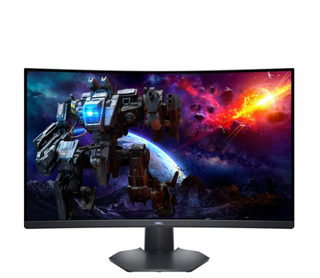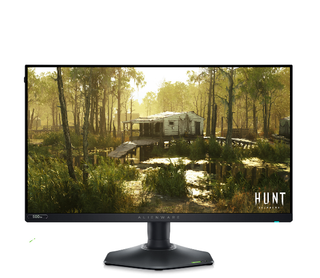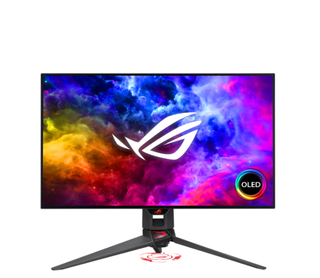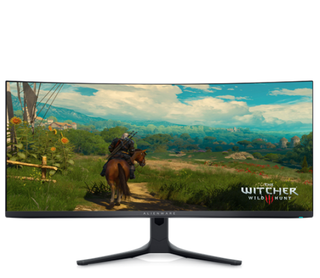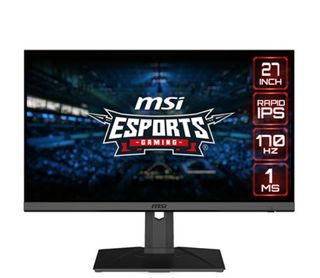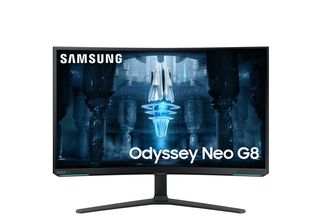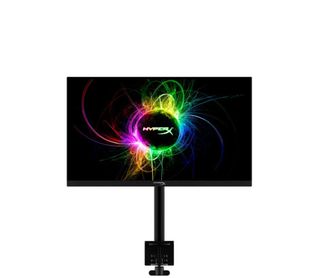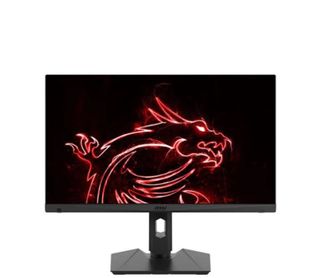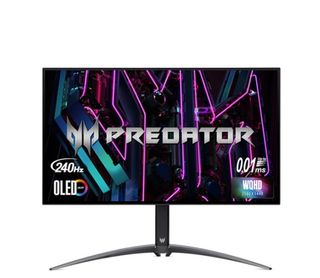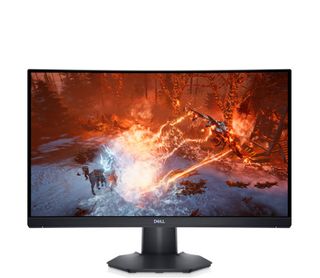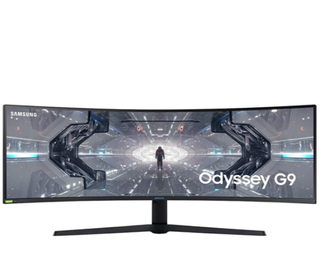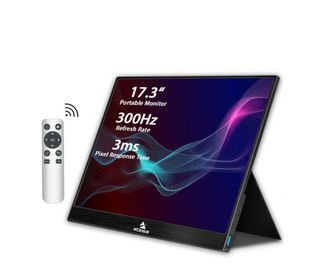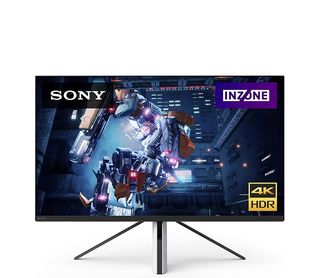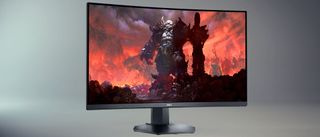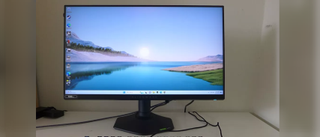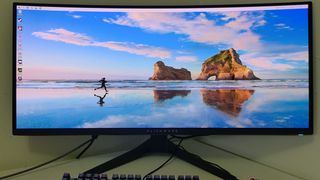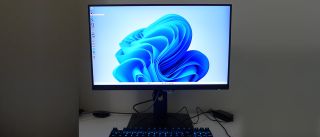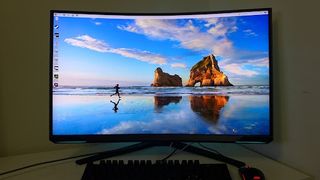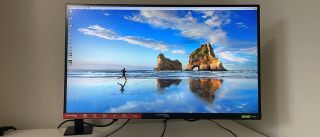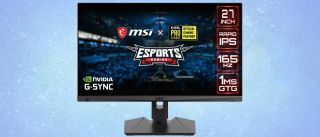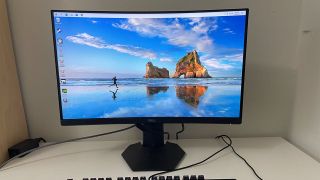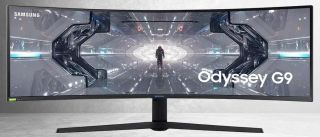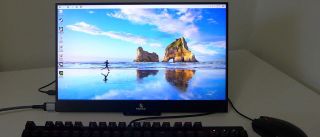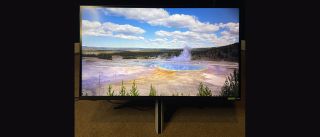Best Gaming Monitors 2024: Budget, Curved, G-Sync and More
Best Gaming Monitors 2024
It’s an exciting time to be a PC gamer needing a new gaming monitor. There are many panel sizes, panel types, resolutions, aspect ratios, refresh rates, and features to choose from produced by numerous popular brands. For example, do you need AMD FreeSync or Nvidia G-Sync support? Do you prefer a traditional flat monitor or a more immersive experience with a curved monitor? The best thing about having so many available options to the consumer is that you can ideally pick the perfect monitor based on your gaming needs.
When seeking the best gaming monitor for your rig, different panel types are vying for your eyeballs — IPS, TN, VA and even OLED — each with its own pros and cons. Of course, you can’t forget about screen size and aspect ratio, which affect your views, desk space and, again, bank account. And we haven’t even discussed bonuses, like speakers, RGB, or port selection. So many options are available to gamers, so some helpful guidance is necessary to make the best possible pick.
Below is a list of the best gaming monitors currently available based on our own tests.
The Quick List
Best Gaming Monitor
The Dell S3222DGM is a true jack of all trades, combining a large screen, excellent performance and a compelling price tag. The monitor features a 2560 x 1440 resolution, boasts refresh rates up to 165Hz and its VA panel generates an incredible contrast ratio of over 4,200:1.
2. Alienware AW2524H 500 Hz
Best Ultra-High Refresh Rate Monitor
Regarding high-refresh rate monitors, the Alienware AW2524H is in a class of its own. Topping out at 500Hz, you’ll need a flagship-class graphics card like the GeForce RTX 4090 to hit those frame rates. Remember that the monitor is a bit on the smaller side, measuring 25 inches across with a 1080p resolution.
3. Asus ROG Swift PG27AQDM
Best OLED Gaming Monitor
One of the best OLED panels out there, the Asus ROG Swift PG27AQDM measures 26.5 inches, has a 3440 x 1440 resolution, and maxes out at 240Hz. This widescreen monitor scored 5/5 stars in our testing and secured our coveted Editor’s Choice award.
Best Widescreen Gaming Monitor
The Alienware AW3423DWF combines two highly coveted qualities in one gaming monitor. It features a QD-OLED panel and the popular 34-inch widescreen form factor. The monitor is dripping with color (equally impressive in SDR and HDR content), has a 165Hz refresh rate, and features Alienware’s typical attention to premium materials and build quality.
Best 170Hz Gaming Monitor
The MSI G272QPF offers a terrific bang for the buck regarding gaming monitors in the sub-32-inch class. The monitor features a 27-inch QHD IPS panel with a 165Hz refresh rate (170Hz overclocked), a 1ms response time, and is both AMD FreeSync and Nvidia G-Sync compatible. Best of all, you can grab the G272QPF for less than $150.
6. Samsung Odyssey Neo G8
Best Curved Gaming Monitor
For those looking for a great monitor to game at 4K resolution, look no further than the Samsung Odyssey Neo G8. The monitor measures 32 inches across and has a 240Hz refresh rate. It is accurate out-of-the-box, and the Odyssey Neo G8 is G-Sync and FreeSync certified and features 1,196 dimming zones.
Best 165Hz Gaming Monitor
The HyperX Armada 27 was lavished with high praise by us for its accurate panel and top-notch video processing. The 27-inch monitor also comes with a nifty mounting arm to free up some space on your desktop that a stand would otherwise take up. Throw in a 165Hz refresh rate and QHD resolution, and you’ve got a real winner here.
8. MSI Optix MAG274QRF-QD
Best Gaming Monitor for Color
MSI puts performance at the forefront with the Optix MAG274QRF-QD, which features a 165Hz QHD panel and Nvidia G-Sync support. However, the ace up the MAG274QRF-QD’s sleeve is its impressively wide color gamut and respectable (for an IPS monitor) contrast ratio.
Best 1440p Gaming Monitor
The Acer Predator X27U offers a compelling package for enthusiasts looking for a high-quality 1440p gaming monitor. Not only does it offer 27 inches of screen real estate with a 240 Hz refresh rate, but its OLED panel delivers good color saturation in SDR and HDR modes.
Best Budget Gaming Monitor
Dell’s S2422HG is on the smaller side for gaming monitors at 24 inches, but it still packs a punch. The curved monitor features a 1080p resolution, excellent contrast thanks to its VA panel, a 165Hz refresh rate, and is regularly found online for under $200.
11. Samsung 49-Inch Odyssey G9
Best Ultrawide Gaming Monitor
The Samsung Odyssey G9 comes with its massive 49-inch VA panel and 5120 x 1440 resolution. Even with the huge panel, there’s still a heady 240Hz refresh rate, a tight curve to keep the action on the screen more immersive, and an incredibly accurate picture.
Best Portable Gaming Monitor
Nexigo’s NG17FGQ hits the ground running with a blazing-fast 300Hz refresh rate over USB-C (240Hz over HDMI), which is stellar for a portable monitor. The 1080p IPS panel measures 17 inches and produces excellent image quality once calibrated.
Best 4K Gaming Monitor for Consoles
The Inzone U27M90 is perfectly suited for the PlayStation 5 as it features a similar design scheme. However, it also works great with the Xbox Series S and Series X consoles. The monitor boasts a maximum refresh rate of 120Hz and includes RGB lighting effects.
Best Gaming Monitors in 2024
Why you can trust Tom’s Hardware
Our expert reviewers spend hours testing and comparing products and services so you can choose the best for you. Find out more about how we test.
Best Gaming Monitor
The Dell S3222DGM is just a great, all-around pick as the top gaming monitor thanks to its excellent image quality, plentiful features and typical solid build quality. At the heart of this display is a 2560 x 1440, curved VA panel that supports both AMD FreeSync and Nvidia G-Sync at up to 165 Hz.
The S3222DGM’s delivers an enviable contrast ratio thanks to its 1800R curved VA panel. While the IPS competition often struggles to break much past 1,000:1, the S3222DGM’s VA panels shot to 4209:1 in our tests. The display also reproduced 122 percent of the sRGB color gamut and 85 percent of the DCI-P3 gamut on our tests along with an incredibly accurate gamut error rate of 2.07dE.
On the connectivity front, the S3222DGM features two HDMI 2.0 connectors and one DisplayPort 1.2 port.
For anyone looking for an excellent gaming monitor that won’t break the bank, it’s hard to argue against the Dell S3222DGM.
Read: Dell S3222DGM Gaming Monitor Review
Best Ultra-High Refresh Rate Monitor
As the world’s first 500Hz gaming monitor, the Alienware AW2524H plants its flag in the ground for all to see. While 360Hz displays are commonplace today, Dell’s new entry ensures no frame tears or motion blur with flagship graphics cards capable of pushing 400+ frames per second.
In addition to its outright speed, the AW2524H commands a 2ms advantage in control lag over its 360Hz peers. Regarding competitive gaming, the AW2524H is an excellent tool for your arsenal. Throw in Alienware’s usual excellent build quality and color performance, the AW2524H is among the best gaming monitors available on the market.
The AW2524H has no real flaws of consequence, but you will need high-end hardware to utilize its performance fully. You’ll need a performant Alder Lake or Raptor Lake processor with a GeForce RTX 4090 graphics processor. The other thing to consider is pricing; the AW2524H is way more expensive than its 360Hz peers. For example, the Asus ROG Swift PG259QN is priced at around $450, while the AW2524H costs $829.99.
But for gamers with the budget and the hardware to pull it fully utilize it, the Alienware AW2524H is hard to beat.
Read: Alienware AW2524H 500 Hz Gaming Monitor Review
Best OLED Gaming Monitor
There are many great gaming monitors out there, but only an elite few are good enough to earn our Editor’s Choice award and a five-star rating. However, the Asus ROG Swift PG27AQDM is one of the monitors for a good reason.
For starters, Asus has endowed the ROG Swift PG27AQDM with a 26.5-inch OLED panel. While Mini LED panels have become very good in recent years, OLED panels are still superior when it comes to contrast. Not only does the panel offer a wide and accurate color gamut, but the overall image quality is simply stunning.
For eSports performance enthusiasts, the ROG Swift PG27AQDM has an impressively low 0.03ms response time and a 240Hz refresh rate with AMD FreeSync support. While Nvidia has not certified the monitor for G-Sync compatibility, we found that it works just fine with the standard in our testing. In addition, total lag time was comparable to faster 360Hz gaming monitors.
Given that this is a gaming monitor, Asus includes all the usual frills like an aggressive design, RGB lighting elements, and a lighting system that projects a ROG logo onto your desk.
The Asus ROG Swift PG27AQDM is costly, as witnessed by its $1,000 price tag, but this monitor’s overall image quality and performance are tough to beat in this class.
Read: Asus ROG Swift PG27AQDM OLED Gaming Monitor Review
Best Widescreen Gaming Monitor
Desktop-class OLEDs used to be a rarity in the gaming monitor segment, but over the years, prices have come down, and more entries have entered the fray. The latest comes to us from Alienware, and it’s the jaw-dropping AW3423DFW.
This is a 34-inch ultra-wide monitor with a 1800R curve and a resolution of 3440 x 1440. However, the most important spec is its use of a Quantum Dot OLED (QD-OLED) panel, which offers an extremely wide color gamut and the blackest blacks you’ll find in a gaming monitor.
The QD-OLED “heart” of the AW3423DFW gives it unmatched contrast and excellent color saturation and we felt no need to calibrate the panel further out of the box. Throw in premium build quality – as we expect from Alienware – and top-notch video processing and the AW3423DFW hit all the high notes without any demerits worth mentioning for enthusiast gamers.
If you can get past the $1,100 price of entry, the AW3423DFW would make a perfect companion for Nvidia’s newest graphics cards, like the GeForce RTX 4090 and RTX 4080.
Read: Alienware AW3423DW Gaming Monitor Review
Best 170Hz Gaming Monitor
We love a good value when it comes to gaming monitors, and the MSI G272QPF is a true standout in this category. The G272QPF features a 27-inch QHD panel, which is the sweet spot for gamers who don’t have a super-powerful flagship graphics card to drive FPS. And while 165Hz is the standard for a monitor of this class, MSI ekes out just a bit more at 170Hz, which is accessible from the OSD.
In addition to nailing the fundamentals, the G272QPF has excellent SDR and HDR color performance, and you don’t need to go through an exhaustive calibration process to achieve those results. In addition, input lag is low and MSI’s usual good build quality shines through here.
We should mention that the contrast ratio is a bit on the lower side (1,000:1) compared to typical IPS panels, and gamma is a bit on the light side. However, there’s very little to complain about here for a monitor that’s retailing for around $240.
Read: MSI G272QPF Review
Best Curved Gaming Monitor
The Samsung Odyssey Neo G8 is just a great overall curved gaming monitor that gets all the basics right, then goes above and beyond for discerning gamers (like its maximum 240 Hz refresh rate).
Samsung also equipped this 32-inch monitor with 1000R VA panel that features Mini-LED lighting with 1,196 dimming zones. We measured contrast at 25,000:1 versus the 3,000:1 typical of VA panels. The excellent contrast should come in handy as you’re lurking in the shadows looking to cap opponents in your favorite first-person shooters.
When the Odyssey Neo G8 debuted, it had a street price of around $1,400. Now, however, the monitor can easily be found for around $1,200 or lower.
Read: Samsung Odyssey Neo G8 Review
Best 165Hz Gaming Monitor
The HyperX Armada 27 is one of those standout monitors that offers the whole package. This is a 27-inch QHD display with a 2560 x 1440 resolution, 165Hz refresh rate HDR and premium built quality that we expect from HyperX.
One thing that makes the Armada 27 stand out (along with its smaller Armada 25 sibling) is the inclusion of a gaming mount for attaching the monitor to your desk instead of a traditional stand. This gives customers greater flexibility in positioning the Armada 27 for height, swivel and tilt.
Video processing on the Armada 27 is solid, with an excellent overdrive implementation, low input lag and minimal motion blur from the backlight strobe. Throw in handy calibration tools and good image quality, and the Armada 27 is a definite winner. We had only a few minor quibbles with the monitor, like the lack of speakers, but that doesn’t detract from HyperX’s rock-solid entry into the gaming monitor field.
Read: HyperX Armada 27 QHD 165 Hz Gaming Monitor Review
Best Gaming Monitor for Color
If you like your games to look extra colorful, the MSI Optix MAG274QRF-QD is the best gaming monitor for your rig. This monitor posted the widest color gamut we’ve ever recorded: 112.19% of DCI-P3 after our recommended calibration. 90% of DCI-P3 would be impressive, so this is one color-saturated screen.
Contrast is also strong for an IPS panel, hitting 1,129.1:1 after our calibration. And for those concerned about speed, this 165 Hz screen kept up with the 170 Hz Gigabyte M27Q in our testing
Color purists, however, will lament the lack of an sRGB mode, considering the MAG274QRF-QD’s sRGB coverage is at 166.33%. Its backlight strobe for fighting motion blur is also a disappointment. You can’t use Adaptive-Sync with it, the brightness goes down by about 50% and it created ghosting that resulted in a parallax effect with fast motion. In addition, this is yet another gaming monitor to offer HDR but without any noticeable image boost over SDR.
But if you can get past those caveats, you’ll enjoy the most colorful monitor to ever hit our lab.
Read: MSI Optix MAG274QRF-QD Review
Best 1440p Gaming Monitor
OLED panels are becoming more prevalent in the gaming monitor sphere, and with that proliferation comes lower prices. This new landscape has given rise to an excellent new gaming monitor from Acer, the Predator X27U.
The 27-inch monitor features a 240 Hz OLED panel with a 2560 x 1440 resolution and a 0.01 ms response time. As you would expect from a premium gaming monitor, both AMD FreeSync and Nvidia G-Sync technologies are supported. The Predator X27U features excellent motion resolution coupled with class-competitive input lag. It also fully leverages its OLED panel to deliver well-saturated color in SDR and HDR content.
We have some quibbles about its performance, including a maximum 600 nits peak brightness and janky controls when switching from SDR to HDR. However, The Predator X27U gets so much right that we can’t imagine that any gamer who chooses one will be disappointed with its performance (or build quality).
And with a street price of around $700, the Predator X27U is a 1440p gaming monitor that is hard to ignore.
More: Acer Predator X27U Gaming Monitor Review
Best Budget Curved Gaming Monitor
The Dell S2422HG might be small in stature at just 23.6 inches across, but it packs quite a punch at a very attractive price point. Not everyone has the cash to drop $400 or $500 on a gaming monitor, so it’s nice to see Dell providing a value-conscious entry here.
The S2422HG has a 1920 x 1080 resolution and a relatively fast refresh rate at 165 MHz. Dell uses a VA panel here, so you get excellent contrast at 3,000:1 (we measured better at 3,261.8:1) and a factory-rated brightness of 350 nits (although we only measured 324 nits). We also commend Dell for including both AMD FreeSync and Nvidia G-Sync compatibility in this budget-oriented monitor.
Video processing for the S2422HG was good in our testing, and the low input lag was appreciated. However, we did have to knock the motor for its lack of sRGB mode, no integrated speakers, and a lack of USB hub functionality.
But with an MSRP of $199, the Dell S2422HG represents an excellent value in this gaming monitor space. In addition, we’ve seen the S2422HG fall to as low as $170 in recent months, which makes it an easy-to-recommend gaming monitor.
Read: Dell S2422HG Review
Best Ultrawide Gaming Monitor
The Samsung 49-Inch Odyssey G9 is one of the most extreme monitors on this page. Not only is it a massive 49 inches diagonally, but it also carries a 1000R curve, the most dramatic curve offered on a gaming monitor today. From a 2-3-feet distance, this panel will fill your view. It’s like having two 27-inch, 1440p monitors in one. You’ll need nearly 4 feet of desk width and 17 inches of depth to accommodate it, but if you do, you’ll enjoy a wraparound gaming environment without image distortion. Are you looking for a smaller ultrawide? The Acer Predator X38 is also excellent.
Testing of the 49-Inch Odyssey G9 revealed excellent contrast (2,152.9:1 after calibration), which climbed to 58,881.7:1 when it came to HDR testing. This is a bright monitor with a sharp picture and accurate DCI-P3 and sRGB color.
At this price, though, we’d expect a little more. For example, the monitor doesn’t offer any blur reduction. However, we typically opt for Adaptive-Sync over motion blur reduction, and motion blur shouldn’t be an issue if you have a powerful enough graphics card. You also don’t get any speakers or, oddly, a framerate counter. But with solid image quality and a whole lot of speed for an ultrawide, some sacrifices are worth making.
Read: Samsung 49-Inch Odyssey G9 Review
Best Portable Gaming Monitor
When you think of displays with a 300Hz refresh rate, you typically picture desktop monitors with a Full HD resolution. However, Nexigo offers something on a smaller scale in the form of the NG17FGQ. This is a 17.3-inch portable monitor that offers a 300Hz refresh rate and connects to a laptop or desktop via HDMI or USB-C (DisplayPort Alt-Mode).
To take advantage of that fast 300Hz refresh rate, you’ll need to connect over USB-C with a computer that supports full bandwidth capabilities. If you decide to connect via HDMI, you’re limited to 240Hz, which is still heady for a portable monitor.
Gaming performance across the board is excellent with the NG17FGQ, and it can produce some amazing colors once the panel is calibrated. Its overall good build quality also means that it should stand up to the rigors of behind tossed around in a bag while traveling.
Nexigo even includes a handy remote that can be used to navigate the on-screen display (OSD). Toss in stereo speakers to blast some tunes on the go, and the NG17FGQ makes a great travel companion for gamers and productivity-minded folks alike.
More: Nexigo NG17FGQ Review
Sony uses a 27-inch 4K IPS panel for the Inzone M9, and it has a full-array backlight with 96 dimming zones. The monitor features two HDMI 2.1 ports, and a contrast ratio that maxes out at 1,000:1. The Inzone M9 also supports Variable Refresh Rates on the Xbox Series X/S and PlayStation 5 along with refresh rates of up to 120Hz at 4K (144Hz max on PCs).
As for pricing, the Inzone M9 debuted at $899, but is now priced around $700 at retailers like Amazon.
Read: Sony Inzone M9 27-Inch 4K Monitor Review
Shopping Tips for Gaming Monitors
When trying to buy the best gaming monitor for your PC, consider the following:
- G-Sync or FreeSync? G-Sync only works with PCs with Nvidia graphics cards, while FreeSync only works with systems using AMD ones. So you can technically run G-Sync on a FreeSync-only monitor, but performance isn’t guaranteed. FreeSync monitors tend to be cheaper, and performance is comparable. For a detailed comparison of the two technologies’ performance, see our Nvidia G-Sync vs. AMD FreeSync comparison article.
- For image quality, TN < IPS < VA < OLED. Typically, TN monitors are the fastest and cheapest but have weaker viewing angles. IPS displays have slightly slower response times but better color than VA monitors. The best gaming monitors for contrast are VA, but VA also has slower response times. Displays with OLED panels are expensive but the most colorful by far.
- Refresh rates: bigger is better. This number explains the number of times your monitor updates with new information per second — stated in hertz (Hz) — and, therefore, how many frames per second (fps) the monitor can display. Bigger numbers mean smoother images. Refresh rate is especially important for gamers, so you’ll want to shoot for a monitor with at least 120 Hz (most gaming monitors offer at least 144 Hz), combined with the lowest response time you can find.
- Resolution: Full HD, QHD, 4K. The most popular screen resolutions for gaming monitors are Full HD (1920 x 1080), QHD (2560 x 1440) and 4K (3840 x 2160). The more pixels a screen has, the sharper its image should look. So a 4K monitor will show a more crisp image and more detail than a lower resolution Full HD monitor. Generally speaking, the lowest resolution monitors push the fastest refresh rates, reaching upwards of 500 Hz. Because they have to push many more pixels, 4K monitors usually top out at a 144 Hz refresh rate, although some can hit 240 Hz.
Savings on Best Gaming Monitors
When shopping for any gaming monitor, including those above, you may save some money by checking out our lists of best computer monitor deals, Dell Coupon Codes, Lenovo coupon codes, LG coupon codes or Newegg coupon codes.
MORE: Best Gaming Monitors
MORE: How We Test PC Monitors
MORE: How to Choose the Best HDR Monitor
#Gaming #Monitors #Budget #Curved #GSync

